- Home
- Patrick O'Brian
The Catalans Page 16
The Catalans Read online
Page 16
He stood with his hands on the inside of the windowsill, resting his weight on them like a shopman standing at his counter: his shoulders were hunched, and his shape, dark and colorless, cutting out the light, oppressed Marcel. And Alain, standing there on the edge of his crisis, did not see anything of the stretch of garden in front of him, nor the pine trees falling away to the sea: he did not see the hoopoe that walked on the grass, suspicious and wary because of the voices from the house, but still too pleased with the garden to fly away. Every other moment it would stop, cock its head, half-raise its crest, and crouch to take off; but then it would change its mind and hurry with busy steps about the parched lawn again. But Alain saw nothing of this; and Marcel, when he was alone again, saw as little.
Alone again, moved by some obscure feeling of substitution, he had taken up exactly the same position as Alain: to replace that dark, ominous, expressionless, and dominating back he stood there, swaying on his hands, his shoulders hunched; and like Alain he saw nothing.
Now, hunching there, he made his familiar secret indraught and now he fancied, or was it more than fancy?—that there was a feral smell, the rank smell of terror, the smell of a wild animal that has just escaped from a trap, an animal running free at last, free from great danger, but with the smell of dread strong and harsh upon it still.
IN SAINT-FÉLIU they were at her again. The three women and Jean Pou-naou. They had insisted on her coming back for the meal, and she had been too weary to find any good excuse. It had begun before the meal, even while Dominique was cutting up the bread, and now that the plates were pushed away it still went on.
They wanted to know if Xavier had said anything. “He must have said something,” pursued Thérèse. “He cannot sit there without a word.”
“Your mother has a right to know these things, Madeleine,” said her Aunt Mimi. And now they would go on again, round and round the same track—openness and confidence, the right to know, the wickedness of secrecy: conjectures, cunning plans. She would tell them if there were anything to tell; but what was there she could say? It was going slowly on and on, but there was nothing fresh each day.
What contact was there left? She would be loving if she could: indeed she loved them very much. They meant to be kind, she knew; but looking round that familiar room she saw it with a stranger’s eyes. Her mother’s face, poised in the act of speech: it was like a woman she had seen before, but long ago. And yet for all these years she had been so kind; so good and loving, and so kind.
They had switched on to Francisco now.
“They say he was seen in Perpignan.”
“Who says?”
“La Patta: he was there.”
“She’s writing letters to him,” said Mimi with a scream.
“I’m not. Truly I’m not,” said Madeleine, but Dominique and Thérèse had taken the alarm. They were shrieking. How could she tell them that it was quite dead? They would not listen: they were so frightened and grasping that they could not believe it even if they heard. The voices went on screaming in the little room. Denunciations, threats, recrimination.
“I always said . . .”
The man’s voice cut through and said, “If he comes back, I’ll serve him out. I’ll serve him out, by God. Mother of God, I’ll rip him up . . .”
On and on: she had heard it so often. Now Mimi was shaking her by the shoulder. “Say he is a bandit. Say he is a bandit.” The force and venom gave her the voice and aspect of an evil woman.
“He is a bandit,” said Madeleine.
This was a great victory. They had always tried to make her say that, and now she had: they had gained something, and now they were quieter, almost kind to her.
It had died slowly, but it was dead. The last dying hurt it gave her had been that woman passing through again in her car—that first one, Claire Delahaye. They had passed on the high road, months ago, one second’s recognizing glance: then the next day she found that she did not mind.
It was Xavier again, what he would do, what he possessed: everything that he had ever said was passing in review, with commentaries from them all.
If only they did not start on Alain again: they had canvassed his presence fifty times, the concert, the drives to Perpignan, the walk. Was he a valuable ally, drawing his cousin on by jealousy? Was he a danger? What was the wisest trick?
“Oh God, do not let them start on that,” she prayed. She could bear the rest, all the sorting out and prying, the picking over of her life: but would they leave just that untouched, if only for today?
THE PASSAGE OF TIME. The passage of time: it is a platitude to say that it is not measured by the turning of the hands of a clock. Nor, Alain reflected, by any mechanical means: the engine of the car was turning at three thousand revolutions a minute, a well-nourished steady hum with the feeling of great power in reserve; the wheels turned at—he tried a complex piece of mental arithmetic: his speed was sixty-one kilometers an hour, and the diameter of the wheels . . . But the answer came out to an improbable figure, and he abandoned it. It did not signify. The essence was that the last twenty-seven kilometers had been rendered tedious beyond measure by a huge lorry, a long-distance hauler who would not let him pass. The great blind square tail of the monster was blundering along at sixty-one kilometers an hour with a cloud of dust behind it, and in this cloud Alain had chafed the whole length of the straight and narrow road that led south from Rancy. It was not that he wished to go so very much faster; this was not far from the speed he would have chosen, for he liked a gentle, gliding cruise on an empty road (and it was much too fast for the lorry, which was bumping about on the crown of the road in a way that would have made the forcing of the passage horribly dangerous)—it was not the slowness that made the time so tedious in its passing; it was the constraint.
And yet it was not tediousness that counted in the right measurement of time: far from it. Indeed, almost exactly the reverse was true, for if one came to measure it by some truer standard than the clock, the vast deserts no longer counted; at the time they seemed interminable, those gray years in station waiting rooms, in aeroplanes, in ships, but once they were over they were finished and done with forever, while those apparently shorter spaces spent in intense and significant activity grew and grew, spread themselves . . . yes, the right measurement would be in terms of nervous energy, in units of personal anxiety. Or if not of anxiety, then of tension, nervous expenditure.
Before him there was a wide patch of road, a sudden widening with a border of yellow sand or gravel, very close and quite short. His foot went down on the accelerator and at once the steady, rather languid hum changed to a full-throated roar; a great force thrust at the small of his back, and leaning over the wheel he shot forward: he was embodied in the machine, he was the machine’s eyes, gauging the space between the lorry and the yellow verge. Now his foot was on the floor and he was surging furiously past the long gray bulk of the lorry’s side. A glimpse of the sullen, angry face of the driver and it was over: he raised his foot gently and blew a hoot of derision on the horn.
Now, with the road open before him he let the speed slacken and the roar of the engine die; the needle sank back to seventy-five and he relaxed in his seat. What a lovely thing that engine was: the car—it was Côme’s car—was a vulgar, scarlet affair with exaggerated lines: but the engine, that was something else again. And it was surely very strange that Côme, an earthy soul if ever there was one, should be capable of appreciating it. There was no doubt at all that he did: when Côme spoke of a new sodium-alloy valve, or triple carburetion or any of the mysteries of the car’s interior, the habitual knowing leer of the “big operator” left his face, and it was replaced by an open ingenuous look of enthusiasm, an earnest look that made him, in those moments when he held a balanced crankshaft in his hands, almost pleasant to look at. Côme, confronted with religion, patriotism, the arts, the seven virtues, could only respond with a horse-laugh: yet there was the capability for genuine, unselfconscious admiration in him
. Why this partial development? Perhaps it was an immense shyness that spread over everything but this one small admitted area. Poor Côme: and decent Côme, on this occasion. He worshiped his rakish, supercharged, scarlet monster; he had the utmost contempt for Alain’s driving; yet he had lent it for this journey with hardly more than a whine—and that without knowing why Alain had been obliged to go to Paris with such urgency. It would not, after all, have been decent to borrow Xavier’s car. There was another car with a personality: a rigid, square, and upright car, black and shining, a car that ran perfectly well, though in a grudging, irresponsive way, in spite of its twenty years.
But to revert to the question of time: it had struck him very forcibly when he was wandering down the interminable boulevard Saint-Germain that the only significant time is that during which you are aware of being in the present. At that particular moment he was living solely in relation to the future—the future that would start when he found the right number and that would become the living, active present when he found the right door—and at most other times he lived almost entirely in relation to the past, to the present that had gone before. He had time and enough to chew over this reflection, for he had started at the wrong end of the boulevard, the comparatively clean end by the river, and he had the long and weary walk all the way along it, past the poor, railed-in dirty ghost of the abbey, past the tourist cafés with the charabancs outside—those strange places where the Americans play at being French and the French at being American—past all hope of quiet and peace, until he came to a gaunt tall building, high and comfortless, with all the sordid venom of a slum and none of that picturesque vitality a slum may have.
It had been a curious interview. At least one of his preconceived ideas had been scattered in the first moment, for he had had to go down the hard and angular naked staircase instead of up it. It had been naive to suppose that a poor young painter must, from the fitness of things, necessarily live in the garret, a romantic notion, too: but it had disturbed him to go down into the underground passages, the square, dark and humid passages that wandered vaguely in the gloom, like the approaches to a fifth-rate hell. He had been disconcerted, too, when more or less by chance he walked in at Francisco’s open door, intending only to ask the way, and found himself in the middle of a roaring scene. A large, fat young woman was addressing a harangue to a man sitting in a wretched attitude on the floor: both stared at him, and Alain, with some words of excuse bumbling in his head, was about to step back into the darkness when the young woman, crying with great bitterness “Oh, I leave him to you,” thrust her way out behind him and slammed the door. As she went, Alain noticed that she was far gone in pregnancy.
That was the beginning; ill-omened, awkward, disagreeable. Francisco must have changed a great deal, judging by the descriptions Alain had received in Saint-Féliu: and in fact he had coarsened terribly; all the fineness of his face had sunk under fat, and fat had invaded his body. The wonderful litheness and grace was gone, and now he gave the impression of bulk, muscle-bound bulk. The same black hair (too much of it, and curling down his neck) and the flashing teeth were there, but the hair was dusty, unwashed, and the teeth that had gleamed in a sun-tanned face no longer had the brown for contrast: and the whites of his eyes were yellow. The eyes themselves were shockingly diminished by the fat around them. Yet still he had the leaping spirit of his earlier days. Or had he? Was not this confusion of canvases, this vie de Bohème, these old patched fisherman’s trousers all a little too good to be true? Too good to be true, together with the eager, boyish, confidential, would-be infectious enthusiasm? And were not these newspaper cuttings rather too carefully preserved? And then the paintings themselves . . . Primitive, of course. Very well: so primitive. No objection; though perhaps there were rather too many primitives in the present world already. But what was the explanation of the big and glossy book of reproductions on the table? Reproductions of other primitives. And why was the book covered up with a cloth—surreptitiously covered after he had been there a little while, covered while he was looking at a series of drawings?
Would he have been deceived if he had not seen Marcel? For Marcel had supplied Francisco with his attitude, and Marcel had assured Francisco that his one paying line was to remain the simple, wide-eyed fisherman. Marcel had not been sure that his advice had sunk in: he had told Alain, with some vexation, that Francisco had for some time opposed his wishes, had prated about “integrity,” had covertly gone on painting in a manner as un-primitive as he could manage; and he feared that once Francisco was away from his immediate influence he might very well continue in this disastrous way. “Disastrous,” he had repeated angrily, for he had a real affection for Francisco, and he wished to put him on the right road. Privately, of course, Marcel thought the pursuit of any of the arts ridiculous for a man, allowable only if the pursuit were undertaken with the intent of diddling the art snobs: for Marcel did not believe that any sane man gave a damn for painting, nor for sculpture, music, or poetry, and that those who pretended to were either fools or were trying to make something out of it.
Would he have been deceived if he had not seen Marcel? It was difficult to say, and indeed it was a useless speculation, because having seen Marcel, and having stripped Marcel naked, he could not be deceived by hearing Marcel’s words all over again, uttered seriously now from an ingenuous countenance. It was strange to hear them repeated, occasionally distorted but generally exact enough, but with the ludicrous difference of stress: the difference between the violent cynicism of Marcel’s voice, aping the phrases that were to pierce the bourgeois hide to the soft marshmallow vulgar heart within, and the solemn, earnest tones of Francisco saying the self-same words. Alain had heard them twice, once as it were an accomplice, the second time as the legitimate audience: the effect was to take a great deal of the humanity away from the second speaker and to give him the strange, disturbing air of an automaton.
And yet what did it all prove? Did it prove anything more than that Francisco had been very much too much influenced in his vocabulary by an older man who was, in his eyes, a considerable writer and a man of great abilities? Could not his painting still be perfectly valid?
Alain looked carefully at the pictures Francisco showed him. He looked very carefully, and as objectively as he was able: apart from the primary necessity of piercing through the painting to the painter, there was the fact that Alain was going to have to buy one of these canvases, and he felt that he might as well have something that he would like. But try as he would, he could not see anything much in them. There was a certain talent, and the color was effective enough sometimes; but there was so much gesticulation, so much emphasis, so much literature. They were not very convincing. It would have been difficult, very difficult for them to have made a convincing show in the circumstances: Alain acknowledged it and made a great allowance for his foreknowledge, his kind of moral eavesdropping, but even so he grew more and more oppressed by his certainty, his ever-increasing certainty, that they were based in affectation, that they were slick, pretentious, and above all that they were dull, dull, dull.
Francisco was pleased with them, however. His voluble explanations and the exertion of bringing them out and putting them on the easel made him sweat: the atmosphere that he created reinforced his self-esteem, and his face shone—shone a little too greasily, in Alain’s opinion. But by this time it was clear enough to Alain that he did not like Francisco, and that he never could like him.
And yet again, what did the painting matter? A very good man could be a wretched painter, and certainly a very good painter could be a miserable, vaunting failure as a man. It was absurd (however tempting) to make an equation of moral and artistic worth.
But studied insincerity in painting? It was a kind of forgery to which a man would have to shape his whole life, was it not? In that case the falsity would run clean through: the man would be lost, drowned in his own pose. This was not a case of technical ineptitude, nor of aesthetic insensitivity, nor even
of vulgarity of soul: no, although all those entered into it, they were nothing compared with the conscious forgery.
Drowned, gone for ever under his own pose, extinguished, a man would be, after such a course. Or at least, if he were not quite lost, as Marcel for example was not lost, then he would have to have a little secret inner life, where he could live with some truth to himself. But that was not the way Francisco was made, surely?
This much was clear. Francisco was a sentimental; that is to say, he could be as hard as nails when he chose, but when he was confronted with a set “pathetic” situation, he dissolved. When Alain, forcing himself to the task, spoke of Madeleine solitary, nagged, mocked, and deserted, Francisco wept like a woman at a cinema. But it was equally clear that this susceptibility to simplified and dramatic situations had involved him hopelessly: it was clear too that he could not resist gestures, gestures of the grander kind, those that involve leaving all, eternal renunciation, perpetual fidelity. Involved hopelessly. He had already “left all” for the middle-aged cinema actress, and then for the fat young woman: he had eternally renounced a great many people and things, and now he was being perpetually faithful to three women at once and presumably to his art as well.
But would the involvement have remained quite so hopeless if Alain had mentioned the establishment, the money settlement? Alain had plowed on to the end, unwilling to leave anything unsaid that he felt he ought to say—this although he was by now convinced of the inutility of his visit—but he had not mentioned the money. He might have come to it in the end if he had not gradually become aware that Francisco was enjoying all this, that the fellow’s vanity was charmed by the idea of broken hearts behind him, and that Francisco was pumping him for details that would flatter his conceit.

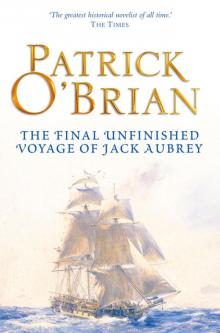 The Final Unfinished Voyage of Jack Aubrey
The Final Unfinished Voyage of Jack Aubrey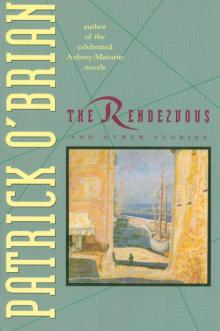 The Rendezvous and Other Stories
The Rendezvous and Other Stories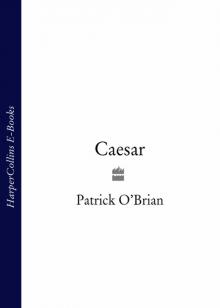 Caesar: The Life Story of a Panda-Leopard
Caesar: The Life Story of a Panda-Leopard The Hundred Days
The Hundred Days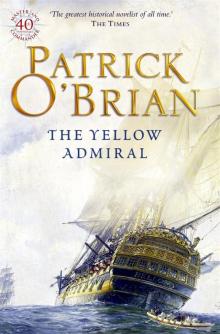 The Yellow Admiral
The Yellow Admiral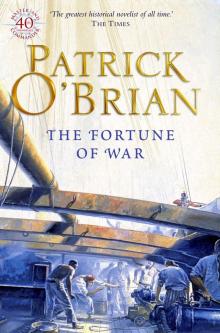 The Fortune of War
The Fortune of War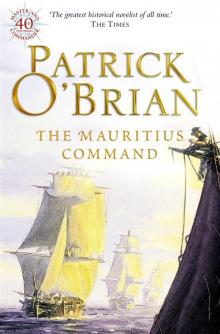 The Mauritius Command
The Mauritius Command Beasts Royal: Twelve Tales of Adventure
Beasts Royal: Twelve Tales of Adventure A Book of Voyages
A Book of Voyages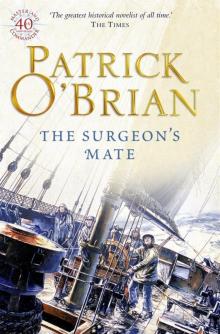 The Surgeon's Mate
The Surgeon's Mate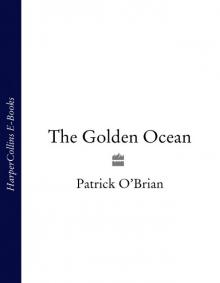 The Golden Ocean
The Golden Ocean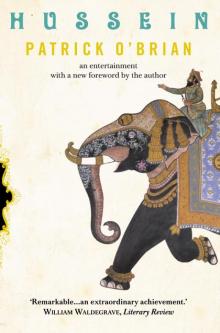 Hussein: An Entertainment
Hussein: An Entertainment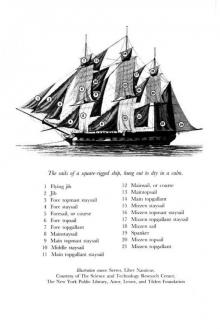 H.M.S. Surprise
H.M.S. Surprise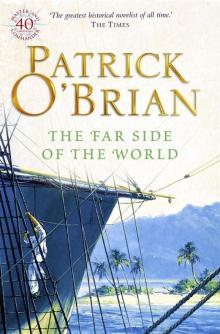 The Far Side of the World
The Far Side of the World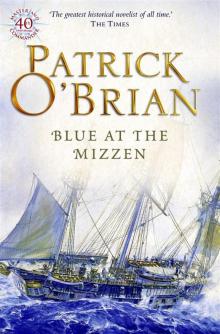 Blue at the Mizzen
Blue at the Mizzen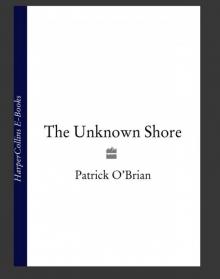 The Unknown Shore
The Unknown Shore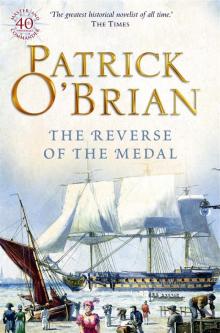 The Reverse of the Medal
The Reverse of the Medal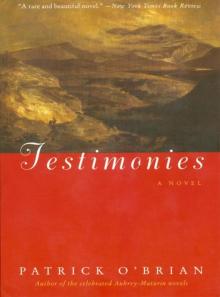 Testimonies
Testimonies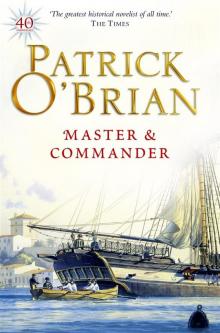 Master and Commander
Master and Commander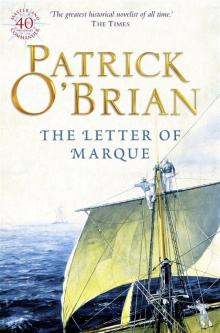 The Letter of Marque
The Letter of Marque Treason's Harbour
Treason's Harbour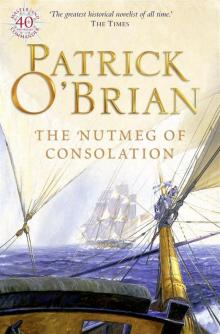 The Nutmeg of Consolation
The Nutmeg of Consolation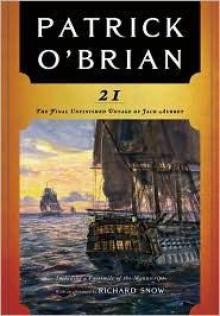 21: The Final Unfinished Voyage of Jack Aubrey
21: The Final Unfinished Voyage of Jack Aubrey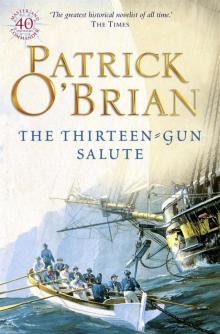 The Thirteen-Gun Salute
The Thirteen-Gun Salute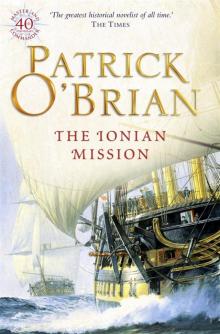 The Ionian Mission
The Ionian Mission Men-of-War
Men-of-War The Commodore
The Commodore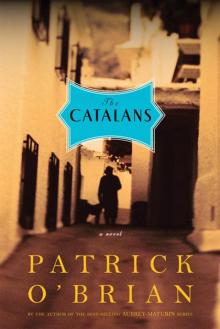 The Catalans
The Catalans Aub-Mat 08 - The Ionian Mission
Aub-Mat 08 - The Ionian Mission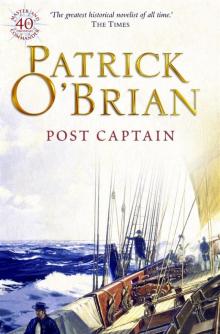 Post Captain
Post Captain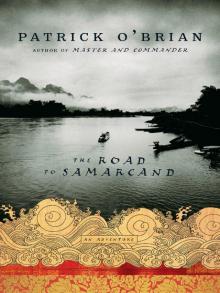 The Road to Samarcand
The Road to Samarcand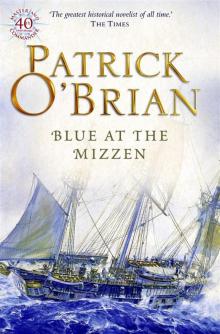 Book 20 - Blue At The Mizzen
Book 20 - Blue At The Mizzen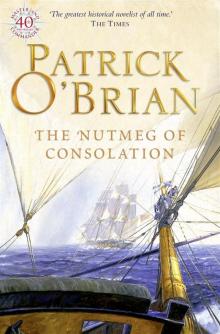 Book 14 - The Nutmeg Of Consolation
Book 14 - The Nutmeg Of Consolation Caesar
Caesar The Wine-Dark Sea
The Wine-Dark Sea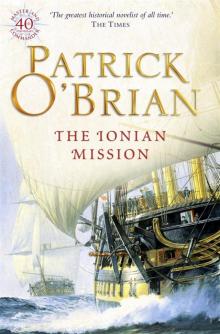 Book 8 - The Ionian Mission
Book 8 - The Ionian Mission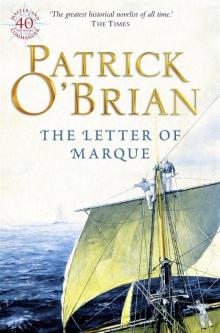 Book 12 - The Letter of Marque
Book 12 - The Letter of Marque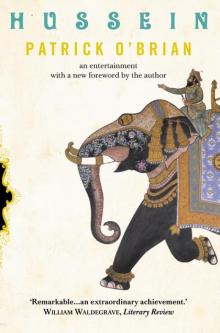 Hussein
Hussein Book 9 - Treason's Harbour
Book 9 - Treason's Harbour Book 19 - The Hundred Days
Book 19 - The Hundred Days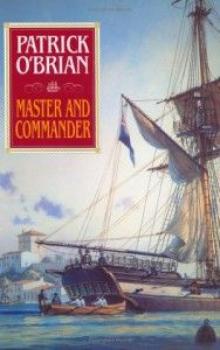 Master & Commander a-1
Master & Commander a-1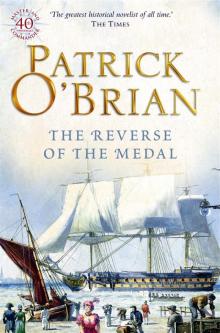 Book 11 - The Reverse Of The Medal
Book 11 - The Reverse Of The Medal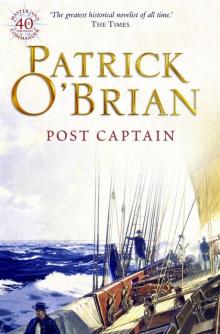 Book 2 - Post Captain
Book 2 - Post Captain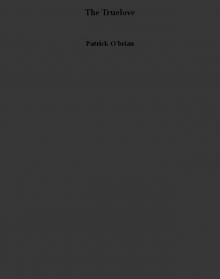 The Truelove
The Truelove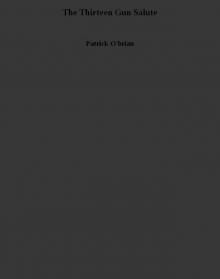 The Thirteen Gun Salute
The Thirteen Gun Salute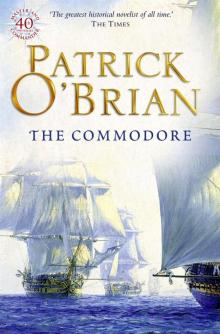 Book 17 - The Commodore
Book 17 - The Commodore The Final, Unfinished Voyage of Jack Aubrey
The Final, Unfinished Voyage of Jack Aubrey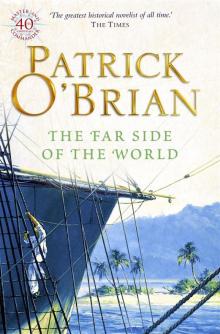 Book 10 - The Far Side Of The World
Book 10 - The Far Side Of The World Book 5 - Desolation Island
Book 5 - Desolation Island Beasts Royal
Beasts Royal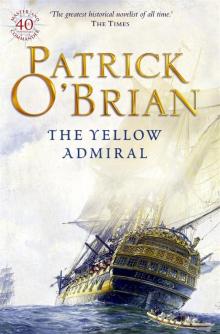 Book 18 - The Yellow Admiral
Book 18 - The Yellow Admiral Book 15 - Clarissa Oakes
Book 15 - Clarissa Oakes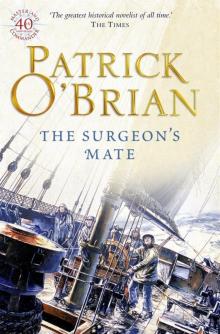 Book 7 - The Surgeon's Mate
Book 7 - The Surgeon's Mate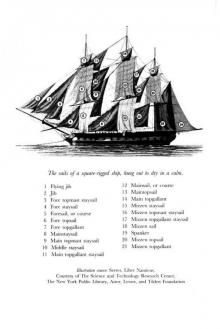 Book 3 - H.M.S. Surprise
Book 3 - H.M.S. Surprise Desolation island
Desolation island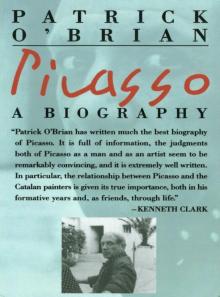 Picasso: A Biography
Picasso: A Biography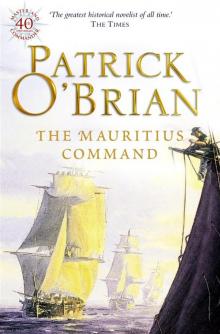 Book 4 - The Mauritius Command
Book 4 - The Mauritius Command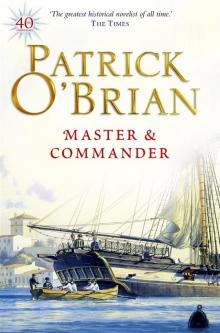 Book 1 - Master & Commander
Book 1 - Master & Commander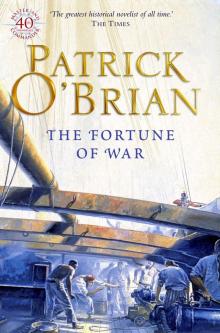 Book 6 - The Fortune Of War
Book 6 - The Fortune Of War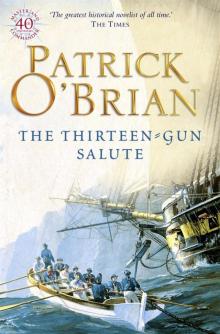 Book 13 - The Thirteen-Gun Salute
Book 13 - The Thirteen-Gun Salute Book 16 - The Wine-Dark Sea
Book 16 - The Wine-Dark Sea